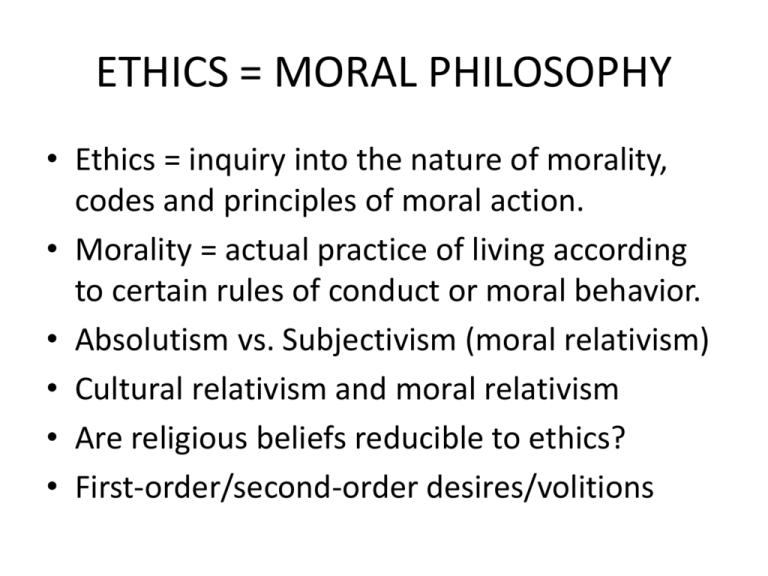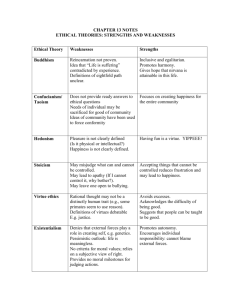ethics = moral philosophy
advertisement

ETHICS = MORAL PHILOSOPHY • Ethics = inquiry into the nature of morality, codes and principles of moral action. • Morality = actual practice of living according to certain rules of conduct or moral behavior. • Absolutism vs. Subjectivism (moral relativism) • Cultural relativism and moral relativism • Are religious beliefs reducible to ethics? • First-order/second-order desires/volitions ETHICAL THEORIES • • • • • • • • COGNITIVIST vs. NONCOGNITIVIST VIRTUE ETHICS (TELEOLOGICAL) UTILITARIAN (CONSEQUENTIALIST) DEONTOLOGICAL (DUTY-ORIENTED) SUBJECTIVISM EXPRESSIVISM EMOTIVISM EXISTENTIALISM ARISTOTLE (384 - 322 B.C.E.) NICOMACHEAN ETHICS • BOOK I – CHAPTER 1 • TELOS = END, PURPOSE, GOAL, FINALITY • Every art and every inquiry, and similarly every action and pursuit, is thought to aim at some good. • Now, as there are many actions, arts, and sciences, their ends also are many. CHAP. 2: ETHICS - POLITICS If, then, there is some end of the things we do, which we desire for its own sake (everything else being desired for the sake of this), and if we do not choose everything for the sake of something else (for at that rate the process would go on to infinity, so that our desire would be empty and vain), clearly this must be the good and the chief good. CHAP. 4: EUDAIMONIA = HUMAN FLOURISHING; WELL-BEING; HAPPINESS; THE HIGHEST GOOD FOR HUMAN LIFE • all knowledge and every pursuit aims at some good, what it is that we say political science aims at and what is the highest of all goods achievable by action. CHAP. 6 – FUNCTION OF HUMAN NATURE • If we declare that the function of man is a certain form of life, and define that form of life as the exercise of the soul's faculties and activities in association with rational principle, and say that the function of a good man is to perform these activities well and rightly, and if a function is well performed when it is performed in accordance with its own proper excellence--from these premises it follows, that the Good of man is the active exercise of his soul’s faculties in conformity with excellence or virtue, or if there be several human excellences or virtues, in conformity with the best and most perfect among them. BOOK II - CHAP. 1 : VIRTUE • Virtue, then, being of two kinds, intellectual and moral, intellectual virtue in the main owes both its birth and its growth to teaching (for which reason it requires experience and time), while moral virtue comes about as a result of habit, whence also its name (ethike) is one that is formed by a slight variation from the word ethos (habit). CHAP. 6 : VIRTUE as MEAN Virtue, then, is a state of character concerned with choice, lying in a mean, i.e. the mean relative to us, this being determined by a rational principle, and by that principle by which the man of practical wisdom would determine it. Now it is a mean between two vices, that which depends on excess and that which depends on defect; and again it is a mean because the vices respectively fall short of or exceed what is right in both passions and actions, while virtue both finds and chooses that which is intermediate. Hence in respect of its substance and the definition which states its essence virtue is a mean... CHAP. 9 : GOODNESS • That moral virtue is a mean, then, and in what sense it is so, and that it is a mean between two vices, the one involving excess, the other deficiency, and that it is such because its character is to aim at what is intermediate in passions and in actions, has been sufficiently stated. Hence also it is no easy task to be good. Ethics - Human Nature • • • • • Chicken-egg question: which came first ? zoon logon /animal rationale zoon politikon Rationality Sociability Aristotle’s critique of Plato’s theory of Forms: Universal Goodness / empirical, particular instances of good (people, constitutions, etc.) • In order to achieve a state of well-being or happiness (eudaimonia), proper social, political institutions are necessary. • Moral virtues – Ethos – Perfectionism Immanuel Kant (1724 – 1804) • • • • • Critique of Pure Reason (1781) The Groundwork of the Met. of Morals (1785) Critique of Practical Reason (1788) Critique of Judgment (1790) The Metaphysics of Morals (1797) • • • • 1. What can I know? – Truth 2. What ought I to do? – Good 3. What can I hope for / judge? – God / Art 4. What is “human” ? Kantian Ethics of Duty = Deontological • • • • 1. There are objective moral values 2. These principles can be known a priori 3. Moral principles must hold universally 4. Reason alone can deliver knowledge of principles that hold universally as duties • 5. Duties are not hypothetical but categorical imperatives (nonconditional, nonempirical) • 6. Autonomy of the will = moral principle Foundations / Groundwork (Grundlegung) • … therefore, the basis of obligation must not be sought in the nature of man, or in the circumstances in the world in which he is placed, but a priori simply in the conception of pure reason; and although any other precept which is founded on principles of mere experience may be in certain respects universal, yet in as far as it rests even in the least degree on an empirical basis, perhaps only as to a motive, such a precept, while it may be a practical rule, can never be called a moral law. Pure Practical Reason • For in order that an action should be morally good, it is not enough that it conform to the moral law, but it must also be done for the sake of the law, otherwise that conformity is only very contingent and uncertain; since a principle which is not moral, although it may now and then produce actions conformable to the law, will also often produce actions which contradict it. The supreme principle of morality • The present treatise is, however, nothing more than the investigation and establishment of the supreme principle of morality, and this alone constitutes a study complete in itself and one which ought to be kept apart from every other moral investigation. • Nothing can possibly be conceived in the world, or even out of it, which can be called good, without qualification, except a good will. Good Will = Freedom • A good will is good not because of what it performs or effects, not by its aptness for the attainment of some proposed end, but simply by virtue of the volition; that is, it is good in itself, and considered by itself is to be esteemed much higher than all that can be brought about by it in favour of any inclination, nay even of the sum total of all inclinations. Will (Wille) vs. Choice (Willkür) • We have then to develop the notion of a will which deserves to be highly esteemed for itself and is good without a view to anything further, a notion which exists already in the sound natural understanding, requiring rather to be cleared up than to be taught, and which in estimating the value of our actions always takes the first place and constitutes the condition of all the rest. In order to do this, we will take the notion of duty, which includes that of a good will, although implying certain subjective restrictions and hindrances. Categorical Imperative • Freedom of the Will = Autonomy = To act from Duty (as opposed to “according to duty”) • Maxim = the subjective principle of volition • The moral law = the objective principle (that which would also serve subjectively as a practical principle to all rational beings if reason had full power over desire) • Duty = to act out of respect for the moral law 1st Formula: Universalizability • There is therefore but one categorical imperative, namely, this: “Act only on that maxim whereby thou canst at the same time will that it should become a universal law.” • … if there is a categorical imperative (i.e., a law for the will of every rational being), it can only command that everything be done from maxims of one's will regarded as a will which could at the same time will that it should itself give universal laws • Formal, universalizable conception of freedom 2nd Formula: Humanity as an End • “So act as to treat humanity, whether in thine own person or in that of any other, in every case as an end withal, never as means only.” • This principle, that humanity and generally every rational nature is an end in itself (which is the supreme limiting condition of every man's freedom of action), is not borrowed from experience, … because it is universal, applying as it does to all rational beings, …as an objective end, which must as a law constitute the supreme limiting condition of all our subjective ends, … it must therefore spring from pure reason. • Material, relational conception of equality 3rd Formula: Realm of Ends • The conception of the will of every rational being as one which must consider itself as giving in all the maxims of its will universal laws, so as to judge itself and its actions from this point of view- this conception leads to another which depends on it and is very fruitful, namely that of a kingdom of ends. • “Act according to the maxims of a member of a merely possible kingdom of ends legislating in it universally.” • Self-contained system conception of community







